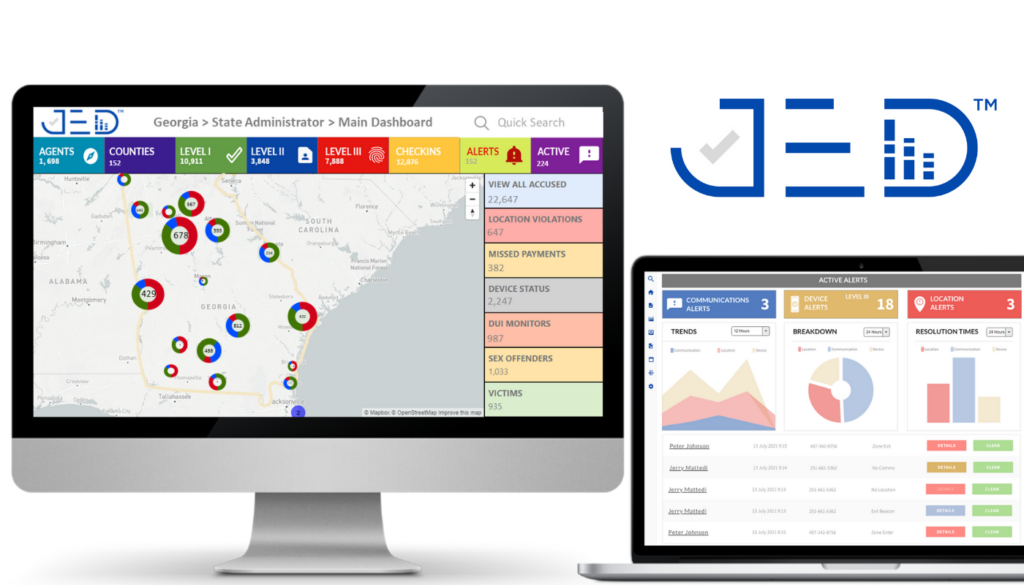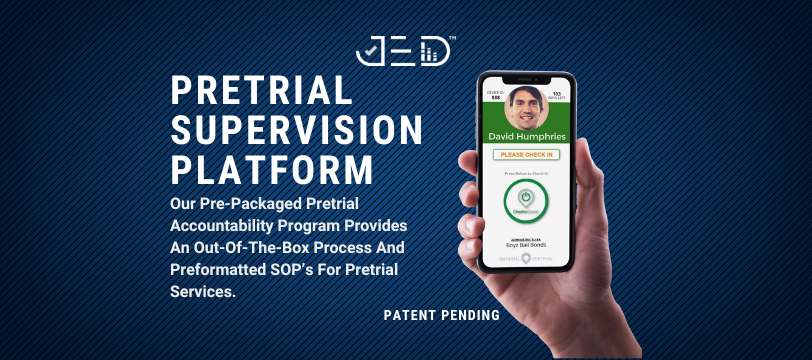
Pretrial Monitoring System Ensuring Public Safety and Compliance
Table of Contents
- Importance of Risk Assessment in Pretrial Accountability
- Types of Risks in Pretrial Accountability Supervision
- GPS Monitoring in Pretrial Accountability Supervision
- Pretrial Drug Testing in Pretrial Accountability Supervision
- Monitoring Apps in Pretrial Accountability Supervision
- Pretrial Monitoring Services
- Pretrial Location Monitoring
- Conclusion
Pretrial accountability supervision is a crucial component of the Pretrial Monitoring system as a part of the whole criminal justice system. It involves various services such as risk assessment, GPS monitoring, pretrial drug testing, monitoring apps, location monitoring, and more. These services are designed to monitor and supervise defendants who are on pretrial release, ensuring public safety while respecting their rights until their trial. By implementing a comprehensive pretrial monitoring system, the process aims to reduce failure to appear in court and ensure proper compliance with court orders.
Importance of Risk Assessment in Pretrial Accountability

Risk Assessment and Management in Pretrial Supervision
Risk assessment plays a vital role in effective pretrial accountability supervision. It is crucial to assess the risks involved to make informed release decisions and ensure the safety of the public. By using standardized risk assessment tools like the JED Platform, jurisdictions can refine their release decisions and reduce unnecessary detention. This not only saves taxpayers money but also lowers the probability of future offenses.
Moreover, risk assessments can promote fairness by identifying defendants who may require additional assistance or supervision during the pretrial period. For example, some defendants may need drug treatment or mental health aid to prevent re-offending or non-compliance with court orders. By identifying these needs early on and providing the necessary resources and support, jurisdictions can prevent future crimes while still respecting the rights of the accused.
In conclusion, risk assessment is critical in pretrial supervision to increase public safety and provide justice to all those involved in criminal proceedings. By accurately evaluating the risk level of each defendant and providing the needed resources and services, jurisdictions can strive for a more equitable and efficient criminal justice system.
Types of Risks in Pretrial Accountability Supervision
To ensure the success of pretrial accountability supervision, it is essential to analyze and address the various risks involved. Understanding the types of risks in pretrial accountability supervision can help jurisdictions effectively monitor defendants and reduce crime before trial. Here are some of the possible risks to consider:
- Flight Risk: It is crucial to keep an eye on defendants who may be at risk of fleeing and not appearing in court.
- Public Safety Risks: Some defendants may pose a potential risk to public safety, requiring extra precautions and monitoring.
- Non-Compliance Risks: Defendants may fail to comply with court orders, ranging from missed meetings to disregarding conditions of release.
By identifying and addressing these risks, pretrial accountability supervision can effectively reduce crime and ensure public safety.
GPS Monitoring in Pretrial Accountability Supervision

GPS monitoring is an essential tool in pretrial accountability supervision, working in conjunction with risk assessment, pretrial drug testing, and monitoring apps. It allows authorities to track the movements and activities of defendants on pretrial release. Here are some benefits of GPS monitoring in pretrial accountability supervision:
- Real-time tracking: GPS monitoring enables authorities to keep tabs on defendants in real-time, ensuring they adhere to court-ordered restrictions.
- Evidence for court proceedings: GPS monitoring provides valuable evidence for court proceedings, helping to establish compliance or non-compliance with release conditions.
- Reminder and alert system: GPS monitoring can remind defendants to abide by the rules and alert authorities when they enter restricted areas or violate curfews.
- Cost savings and increased compliance: GPS monitoring can reduce reliance on incarceration, resulting in cost savings for taxpayers. It also increases offender compliance rates as defendants know they are being monitored.
In conclusion, GPS monitoring is an essential tool in pretrial accountability supervision, ensuring compliance with court orders and promoting public safety.
Pretrial Drug Testing in Pretrial Accountability Supervision
Pretrial drug testing is a critical aspect of pretrial accountability supervision. It helps ensure defendants comply with their trial processes and identify any substance abuse problems that may hinder their reintegration into society. Pretrial drug testing serves several important purposes:
- Ensuring court orders are followed: Drug testing helps ensure that defendants adhere to court-ordered conditions, including abstinence from drugs and alcohol.
- Identifying substance abuse problems: Pretrial drug testing can identify any substance abuse issues that defendants may have, allowing for appropriate intervention and treatment.
- Providing recommendations for bail and sentence: Pretrial drug testing information can be used to inform bail and sentence recommendations, promoting public safety and ensuring defendants receive the necessary support and treatment.
- Motivating positive behavior changes: Pretrial drug testing can motivate defendants with substance abuse issues to seek help outside the criminal justice system and make positive changes in their lives.
There are different types of pretrial drug testing methods, including urine analysis, hair follicle tests, and skin patch tests. Each method has its advantages and disadvantages, such as cost-efficiency, detection window, and chances of sample adulteration. The choice of testing method depends on the specific needs and requirements of the court.
In conclusion, pretrial drug testing is a crucial part of pretrial accountability supervision, ensuring compliance with court orders, promoting public safety, and providing defendants with the necessary support for rehabilitation.
Monitoring Apps in Pretrial Accountability Supervision

Monitoring apps play a significant role in pretrial accountability supervision, working alongside other tools such as risk assessment, GPS monitoring, and pretrial drug testing. These apps provide a range of benefits and enhance the effectiveness of pretrial supervision. Here are some advantages of using monitoring apps in pretrial accountability supervision:
- Enhanced safety and reduced criminal activity: Monitoring apps allow authorities to track the activities and location of defendants, reducing the risk of criminal activity and enhancing public safety.
- Efficient communication: Monitoring apps provide an efficient method of communication between defendants and their pretrial officers, reducing the need for physical meetings while ensuring compliance with court-mandated rules.
- Data collection and analysis: Monitoring apps collect and manage essential data, which can be analyzed to identify patterns or gaps in supervision practices, improving the overall effectiveness of pretrial accountability supervision.
- Transparency in the pretrial process: Monitoring apps promote transparency in the pretrial process, as defendants have access to the same information as their pretrial officers, fostering trust and accountability.
Examples of monitoring apps used in pretrial accountability supervision include Check-in Center, which provides location-based check-ins with facial recognition, Remote Breath, which remotely tests alcohol levels with breath or urine samples, and GPS Monitor, which uses satellite technology for real-time location tracking. These apps provide increased security and safety, reduce costs, and enhance public safety by ensuring compliance with release conditions. In conclusion, monitoring apps are essential tools in pretrial accountability supervision, improving efficiency, accuracy, and transparency in the criminal justice system.
Pretrial Monitoring Services
Pretrial monitoring services are imperative for maintaining proper order and ensuring compliance during the pretrial period. These services encompass various methods and strategies to monitor defendants awaiting trial. Here are some types of pretrial monitoring services commonly used:
- Supervised Release: Supervised release involves in-person check-ins with a probation officer to monitor the defendant’s behavior and compliance with release conditions.
- GPS Monitoring: GPS monitoring utilizes satellite-based tracking to provide real-time location information and ensure defendants adhere to their release restrictions.
- Drug Testing: Random drug tests conducted by a third-party service provider help monitor defendants’ compliance with abstinence from drugs and alcohol.
- Curfew Enforcement: Curfew enforcement ensures defendants adhere to court-ordered curfews, promoting public safety and compliance.
These pretrial monitoring services are essential for public safety, reducing repeat offenses, and ensuring defendants meet their legal obligations. By tailoring the services to each defendant’s needs, jurisdictions can effectively manage the risks of supervision and promote rehabilitation.
Pretrial Location Monitoring

Pretrial location monitoring is a crucial component of pretrial accountability supervision. It involves tracking the movements and activities of defendants on pretrial release, ensuring they remain within the jurisdiction and comply with court orders. Pretrial location monitoring includes GPS monitoring and monitoring apps, and it offers several benefits:
- Accountability and compliance: Pretrial location monitoring holds defendants accountable for their actions, ensuring they comply with release conditions and court orders.
- Rapid response to violations: Location monitoring enables authorities to quickly respond to any violations that may occur during the pretrial period, ensuring the safety of the community.
- Trust and transparency: By implementing reliable tracking systems and check-ins, pretrial location monitoring promotes trust in the criminal justice system while upholding individuals’ constitutional rights.
There are various types of pretrial location monitoring methods, including GPS tracking, radiofrequency monitoring, biometric monitoring, cellular or wireless-based monitoring, and voice verification monitoring. Each method has its advantages and limitations, and the choice of method depends on factors such as the nature of the offense, proximity restrictions, and cost-effectiveness.
In conclusion, pretrial location monitoring is an essential tool in pretrial accountability supervision, ensuring compliance, promoting public safety, and maintaining trust in the criminal justice system.
Conclusion
A comprehensive pretrial monitoring system is crucial for ensuring public safety, compliance with court orders, and reducing recidivism rates. By combining risk assessment, GPS monitoring, pretrial drug testing, monitoring apps, and location monitoring, jurisdictions can effectively supervise defendants awaiting trial, promoting fairness and accountability. Pretrial monitoring services play a vital role in managing defendants, providing necessary support, and reducing the burden on the criminal justice system. By implementing a robust pretrial monitoring system, authorities can strive for a more equitable and efficient criminal justice system, ultimately benefiting defendants and society.
To learn more about the JED Platform and its role in pretrial accountability supervision, visit https://jedplatform.com.

